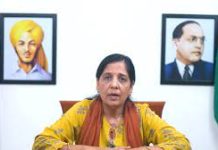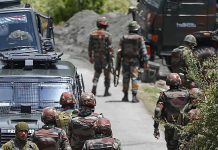Olaf Scholz’s center-left SPD has emerged as the largest party with 206 seats in the german election results. It narrowly topped the polls with about 26% of the votes. The election has delivered a fragmented picture balancing forces of left and right. CDU finished at only two percent points behind SPD. A report by Amit Parkash Singh
In Europe, Germany is considered economically, politically and culturally very vibrant. After the Berlin wall was demolished, the whole politics got changed. This was a new beginning. A new breed of young politicians, writers and thinkers came up. The present Chancellor of Germany, Angela Merkel, is one of them. She is holding the top post for the last sixteen years. She is a good administrator, politician and a cautious leader on climate change issues. She has political acumen to control her party and understands the opposition too.
In the cold month of January last year Ms. Merkel decided not to be active in politics. Her decision stunned not only the members of her own party members, but the opposition too. A successor was chosen in her party where as the opposition took it a challenge to come to power. The opposition focused on their voters and the preliminary results also came last month. The election results ends Merkel’s party’s run for the top job. But the problem is that her successor cannot be finalised unless the top leaders of other like-minded parties do not agree on their common issues as well as decide on several important issues related with European Union, neighbouring nations and US, a long-time strategic friend .
According to the official results, Olaf Scholz’s center-left (SPD) is the largest party with its 206 seats. The total number of seats in the Bundestag (parliament) is 416 . The election was held on 299 of 299 seats. Ms Merkel’s party and its alliance partner (CDU\CSU) is not far behind – it has got 196 seats. Among other parties, the Green (Grune) party has improved its performance by securing 118 seats. Among other important little parties, business friendly liberal party (FPD) has got 92 seats. And other party famous for its radical thinking said to be far right nationalists (AFD) could not increase its tally, where as last time it won more than 20 seats. All the parties have come out in one voice that this party would not be consulted in making of new government. The populist left party which is spelt Linke has this time got only 39 seats. The magic figure to form new government is 368.
According to the election observers the CDU’s associate party CSU has already had meeting of its leaders and said that it has its voters intact in South Eastern state but elsewhere its partner party CDU did very badly even in its heartlands. Whereas the SPD recovered votes in many areas of north-eastern Germany where it has been traditionaly strong. However once the populist parties lost their share. Whereas AFD’s vote share strengthened locally in Thuringia. But the Greens proved their strength in western Germany.
A student of politics in Frankfurt said, “Everybody is ignoring AFD fortunately. It seems SPD and CDU may align, but out of sixteen years of Merkel’s government there was constellation for twelve of those years. So many like me want a change.” “It seems that three parties SPD, Grune and Linke may align as their agendas are closer to but Linke is much week as there is not enough seats,” Hannes continued. In such a situation there are two options, but both options involve Grune and FDP. The main leaders of Grune are Annalena Baerbock (earlier she was their first chancellor candidate), and the leader from FDP is Robert Habeck . As they have a gender quota all through their parties so it means that every other post may go to men. Only the hitch is who will be the strongest third party. It seems both the parties are trying to find a middle path, as they are farthest apart from each other. Ironically, the strongest party in a coalition would have its chancellor.
Presently SPD is strongest party to have emerged it is having having rounds of negotiations with the like-minded parties. Its revival in Germany gives hope to centre-left parties in parts of Europe. The SPD’s chancellor candidate Olaf Scholz hopes to strike a balanced coalition before Christmas. Although his conservative rival Armin Laschet still hopes to form a government despite coming second.

However. the SPD which came first in election and the second place conservative CDU\CSU bloc hope to lead the next government. It is possible, when they agree to form an alliance with the parties that finished third or fourth – the Greens and the FDP the liberal Free Democrats. As the voters have preferred this time the opposition so, there is no option for a grand alliance.
After two years, SPD has been able to prove itself a political force. It narrowly topped the polls with about 26% of the votes. The election has delivered a fragmented picture balancing forces of left and right. CDU finished at only two percent points behind SPD. However Greens have scored their best ever result in finishing third. Now their influence in coalition negotiations has increased.
The two smaller parties have begun the possibilities of alignment using their new-found influence by launching dialogue among each other. They are almost fully prepared to talk with SPD or CDU\CSU despite their deep differences on most of the issues. After the election results were out, to secure majority in Bundestag (Parliament), the issue based parleys between the smaller parties like, Greens and FDP is now in final mode. Whereas there are reports about those leaders who desire to sabotage the negotiations for such alliance.
The political observers say that in Germany, the coalition syndrome is not new. “Last time in 2017, the continuous parleys between the leaders continued for 171 days,” says Hannes, “It took quite a long negotiations between CDU, FDP and Green leaders. And in the very end, FDP cancelled the deal. This made the people of this country quite angry. On 24th September 2017, the federal elections were held to elect the members of 19th Bundestag as well as 111 states.“But this time there seems some seriousness. This time, in the talk there is the leader of CDU, Laschet alongwith Soder, who leads the sister party CSU and SPD led by Scholz .”
If some agreement takes place then Scholz, who is only 63 years old, would be the fourth post–war SPD Chancellor after Willy Brandt, Helmut Schmidt and Gerhard Schroeder, who was finance minister in Ms. Merkel’s cabinet. In Europe, the result of election in Germany has stunned the people. But there is still hope that the new government in the new year would bring more peace and prosperity.
Complex election process
The German Federal election process for Bundestag (Parliament) is quite complex . In the month of September this year the election 2021 took place . After a few days the results also came out. But the polling took place only in 299 constituencies and the results of all constituencies are out.
Usually Germans elect their members of parliament with two votes. The first vote is for a direct candidate who is required to receive a plurality vote in their electoral district . The second Vote is to elect a party list in each state as established by its respective party.
The new Bundestag or lower house will have 735 lawmakers The parliament varies in size because of peculiarity of Germany’s electoral system , which means it can be considerably bigger than the minimum 595 seats . The system seeks to combine both direct and proportional representations, while guarding against the electoral mistakes of German history which saw political fragmentation during past.
As Germany is always ruled by two or three party coalition. And the new Bundestag must hold its first session within thirty days of general election, so the party, which has got the most votes may begin talk with other parties to make alliance to form the government, with whom it then control an absolute majority of seats in parliament. So that it may be able to pass the legislation by the Bundestag.
So the total seats in Bundestag is 598. And the first part the post for 299 seats. Which is fifty percent. The propositional representation for 299 seats is fifty percent for party delegates . Once its clear that which party has won the most seats will establish a coalition agreement of the new government to begin. The agreement lays down the plans for the four year term and in this details the coalition partner’s name who they want to be chancellor and whom they might support.
First vote is for direct candidate who is required to receive a plurality vote in their electoral district . The Second vote is used to elect a party list in each state as established by its respective party caucus.
The system seeks to combine the both direct and proportional representation while guarding against the electoral mistakes of German history which saw political fragmentation during past.
As the election result unfold, it is clear that coalition government is going to rule . Germany has always run by a coalition two or three parties .After the declaration of results new Bundestag holds its first session within 30 days of general election . The winner begins a series of talks with the other parties to find partners with whom it may form an absolute majority of seats in the Bundestag.
Once it is clear that with which party or parties the party which has got the maximum votes have collaborated then a coalition agreement is prepared ,on its basis the new government has to begin .The agreement lays down the plans for the four year term and in these talks the coalition partners name whom they want to be chancellor and who they want to hold which position in the cabinet.
Next, the six hundred plus members of the newly elected parliament would hold their first session and vote for the next chancellor in a secret ballot. It is up to the president to suggest a candidate when the Bundestag convenes for the first time . He is not obliged to suggest the person’s name if the parties have singled out in coalition talks .But he may present a candidate who has a reasonable chance of being voted in. If the person receiving in the first round of voting the president may declare him as new chancellor.













